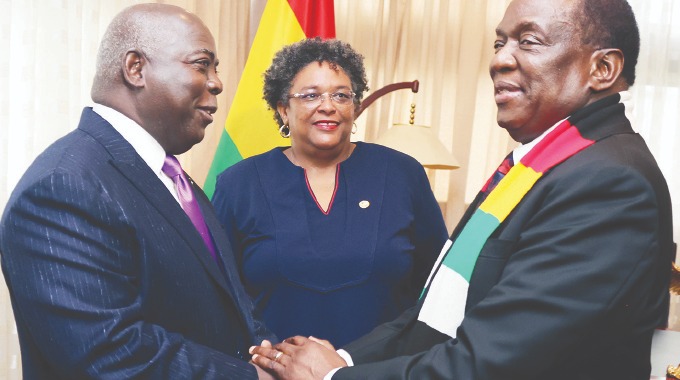Ghana and Zimbabwe have recently signed a groundbreaking general cooperation agreement, marking a significant step towards establishing a formal framework for political and socio-economic relations between the two nations.
The agreement was signed yesterday in Accra in the presence of Zimbabwean President Emmerson Dambudzo Mnangagwa.
The signing ceremony was attended by Finance and Economic Development Minister Professor Mthuli Ncube and Ghana’s Deputy Minister for Foreign Affairs, Kwaku Ampratwum Sarpong.
The event took place on the sidelines of the ongoing 30th Annual Meetings of the African Development Bank. The signing was also witnessed by Zimbabwe’s Ambassador to Ghana, Kufa Chinoza, and Ghana’s envoy to Harare, Ambassador Grant Ntrakwa.
Following the signing ceremony, Deputy Minister Sarpong emphasized the historic nature of the event. He noted that although Zimbabwe and Ghana have maintained relations for over 60 years, no formal agreements have been in place to enhance cooperation until now.
Deputy Minister Sarpong highlighted the significance of formalizing the relations between the two countries, allowing for a more focused approach to cooperation. Priority areas such as agriculture, tourism, and aviation will be explored for collaboration.
He emphasized the need for diligent implementation to elevate the bilateral relations between Ghana and Zimbabwe.
Ambassador Chinoza, speaking to the media after the signing ceremony, regarded the agreement as a crucial starting point.
He expressed the hope that it would eventually evolve into a comprehensive joint permanent and bi-national cooperation agreement. Ambassador Chinoza emphasized the importance of further enhancing cooperation between the two countries.
The historical connection between Zimbabwe and Ghana traces back to their founding Presidents, Robert Mugabe and Kwame Nkrumah, both driven by the pan-Africanist ideology. The shared history includes Mugabe marrying in Nkrumah’s country.
Zimbabwe has been actively seeking to strengthen cooperation with various countries as part of its Second Republic’s engagement and re-engagement initiative.
This pursuit of collaboration comes after years of isolation resulting from sanctions imposed by the United States and the European Union, which aimed to isolate Zimbabwe from the international community due to its implementation of the Fast Track Land Reform program.
The program aimed to rectify colonial injustices related to land ownership and ensure equitable access to land for indigenous Zimbabweans.
President Mnangagwa returned to Zimbabwe following the signing ceremony, concluding his visit to Ghana.


